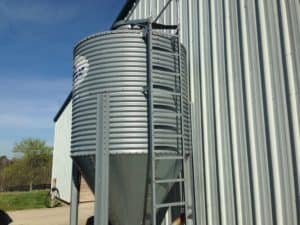
Many people over feed their horses. I would say there are plenty of horses out there that are receiving grain daily that have really no business eating grain at all. We often get it in our heads that horses need grain to feel full and be happy. This really is not the case. Hoses evolved to eat mainly forage. If your horse is not in hard work, not lactating/pregnant, and not a young growing foal, then as long as they have quality forage and/or good pasture, they probably do not need those 6 lbs. of sweet feed per day that they have been getting. If you know your horse does not need many extra calories but are concerned about the protein and vitamins and minerals he is receiving, then that is the concept behind using ration balancers. They are meant to be fed at only 1-3 lbs. per day and provide the extra protein, vitamins, and minerals that your horse may be lacking. Horses also are meant to consume 1-2% of their body weight in hay per day. That would mean an average 1,000 lb. horse would need to consume about 10-20 lbs. of hay per day. Don’t give more than is necessary for your horse. Feed according to their activity level and body condition. So much hay goes to waste all the time…and that is just like throwing money out the window!
But let’s say your horse does need grain. Whether it is a competition horse, broodmare, or a growing baby, it needs some sort of concentrate to thrive. Well the least expensive grain really is not going to save you lots of money. It all comes down to feeding rates. A cheap grain is very likely low in fat. This means that the low fat, cheap bag of feed is not giving your horse nearly the amount of calories that a higher fat feed would. You can feed far less of a high fat feed than you can of a low fat feed. Don’t be misled by the immediate satisfaction of a low price tag…in the long run you lose out big time!
There is also some management techniques that can help you save on the cost of feed. Feed only what you need. I can’t even begin to grasp just how many thousands of supplements are out there on the market right now. And they are all telling you that you and your horse need them. Giving your horse something he does not really need is an all too common practice in the equine world. You will most likely find that feeding a quality hay and grain will supply all the nutrients that your horse needs. If every horse in the barn is getting some kind of supplementation…something is wrong! Don’t fall into the trap of thinking you are giving your horses the “edge” by pumping them with extra protein and vitamins and minerals that they don’t need. Also be cognizant of the type of feed you end up buying. Higher protein feeds tend to cost more than lower protein feeds…so if your middle aged horse is receiving a high protein grain, you may want to re-evaluate you program. That horse does not need a high protein feed like a broodmare or a growing horse would. Feed it what it needs and you will come out with more money in the end.
The take away message…feed quality hay always. Get your hay tested to insure that it is of quality. Next, if you decide that your horse needs a ration balancer or a type of concentrate, select one from a reputable company that only uses quality ingredients. And finally, be specific about what your horse needs and don’t go beyond that. More is not always better!!

165 North Clay Street
Louisville, Kentucky 40202
Kentucky website design & hosting by Envy Interactive.